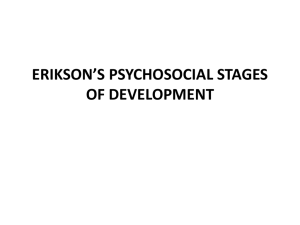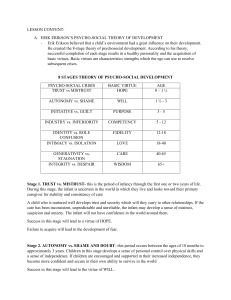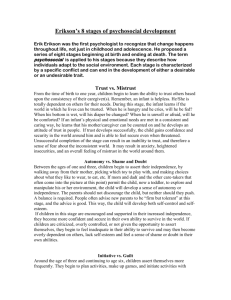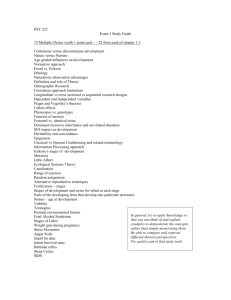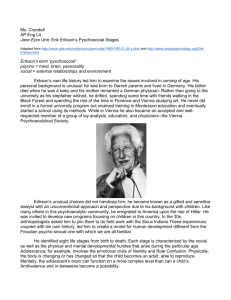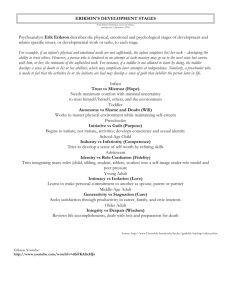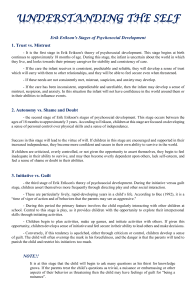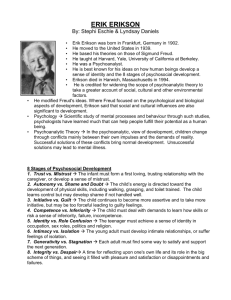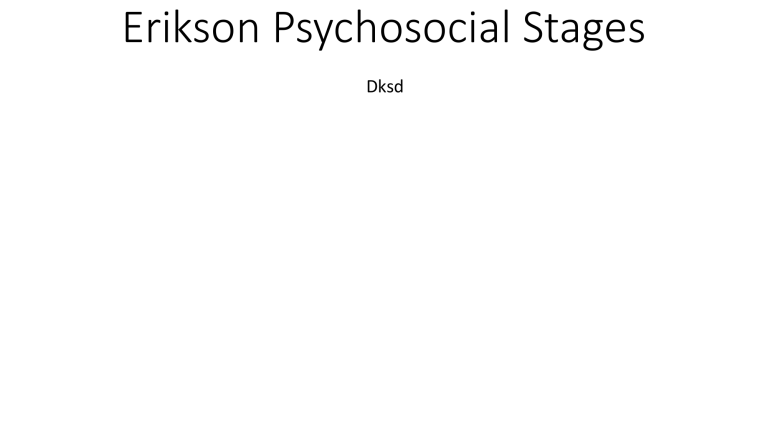
Erikson Psychosocial Stages Dksd Trust vs Mistrust(birth – 12 month) • Trust vs. mistrust is the first stage in Erik Erikson's theory of psychosocial development • During this stage, the infant is uncertain about the world in which they live, and looks towards their primary caregiver for stability and consistency of care. If the care the infant receives is consistent, predictable and reliable, they will develop a sense of trust which will carry with them to other relationships, and they will be able to feel secure even when threatened. If the care has been inconsistent, unpredictable and unreliable, then the infant may develop a sense of mistrust, suspicion, and anxiety. In this situation the infant will not have confidence in the world around them or in their abilities to influence events. Con’t…. • Success in this stage will lead to the virtue of hope. By developing a sense of trust, the infant can have hope that as new crises arise, there is a real possibility that other people will be there as a source of support. • Failing to acquire the virtue of hope will lead to the development of fear. This infant will carry the basic • sense of mistrust with them to other relationships. It may result in anxiety, heightened insecurities, and an over feeling of mistrust in the world around them. Autonomy vs. Shame and Doubt(18 month – 3years) • According to Erikson, children at this stage are focused on developing a sense of personal control over physical skills and a sense of independence. • Success in this stage will lead to the virtue of will. If children in this stage are encouraged and supported in their increased independence, they become more confident and secure in their own ability to survive in the world. • If children are criticized, overly controlled, or not given the opportunity to assert themselves, they begin to feel inadequate in their ability to survive, and may then become overly dependent upon others, lack self-esteem, and feel a sense of shame or doubt in their abilities. . Initiative vs. Guilt(3 o. During this stage, children assert themselves more frequently through directing play and other social interaction. oThe primary feature involves the child regularly interacting with other children at school. Central to this stage is play, as it provides children with the opportunity to explore their interpersonal skills through initiating activities • Children begin to plan activities, make up games, and initiate activities with others. If given this opportunity, children develop a sense of initiative and feel secure in their ability to lead others and make decisions Con’t • Conversely, if this tendency is squelched, either through criticism or control, children develop a sense of guilt. The child will often overstep the mark in his forcefulness, and the danger is that the parents will tend to punish the child and restrict his initiatives too much. • It is at this stage that the child will begin to ask many questions as his thirst for knowledge grows. If the parents treat the child’s questions as trivial, a nuisance or embarrassing or other aspects of their behavior as threatening then the child may have feelings of guilt for “being a nuisance”. • Too much guilt can make the child slow to interact with others and may inhibit their creativity. Some guilt is, of course, necessary; otherwise the child would not know how to exercise self-control or have a conscience. . Industry vs. Inferiority(5 – 12 years) • Children are at the stage where they will be learning to read and write, to do sums, to do things on their own. Teachers begin to take an important role in the child’s life as they teach the child specific skills. • It is at this stage that the child’s peer group will gain greater significance and will become a major source of the child’s self-esteem. The child now feels the need to win approval by demonstrating specific competencies that are valued by society and begin to develop a sense of pride in their accomplishments. • If children are encouraged and reinforced for their initiative, they begin to feel industrious (competent) and feel confident in their ability to achieve goals Con’t • If the child cannot develop the specific skill they feel society is demanding (e.g., being athletic) then they may develop a sense of Inferiority. • Some failure may be necessary so that the child can develop some modesty. Again, a balance between competence and modesty is necessary. Success in this stage will lead to the virtue of competence. Identity vs. Role Confusion(12 – 18 years) • During this stage, adolescents search for a sense of self and personal identity, through an intense exploration of personal values, beliefs, and goals • Children are becoming more independent, and begin to look at the future in terms of career, relationships, families, housing, etc. The individual wants to belong to a society and fit in Con’t • This is a major stage of development where the child has to learn the roles he will occupy as an adult. It is during this stage that the adolescent will reexamine his identity and try to find out exactly who he or she is. Erikson suggests that two identities are involved: the sexual and the occupational. • Erikson claims that the adolescent may feel uncomfortable about their body for a while until they can adapt and “grow into” the changes. Success in this stage will lead to the virtue of fidelity. • During this period, they explore possibilities and begin to form their own identity based upon the outcome of their explorations. Failure to establish a sense of identity within society ("I don’t know what I want to be when I grow up") can lead to role confusion. Role confusion involves the individual not being sure about themselves or their place in society. In response to role confusion or identity crisis, an adolescent may begin to experiment with different lifestyles (e.g., work, education or political activities).
